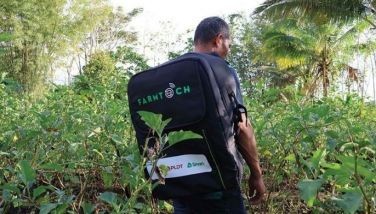Source of embarrassment

Here’s another source of embarrassment for the country.
According to the Asia Video Industry Association Coalition Against Piracy (CAP) 2024 annual consumer survey by YouGov, the Philippines is among the biggest consumers of pirated content in Asia.
The survey revealed that piracy in the country has risen by 13 percent yearly, with a population piracy rate of 71 percent, making it one of the region’s hotspots.
Copyright infringement, also called piracy, is the use of works protected by copyright without the consent of the copyright owner and this includes illegally reproducing, distributing, displaying or performing the protected work.
The CAP report noted that while there is a decline in traditional piracy methods such as pirate TV boxes, apps and illicit streaming or torrent websites, there is a concerning rise in Asia-Pacific piracy due to an uptick in piracy via social media and messaging platforms. Piracy, it disclosed, is now affecting 59 percent of consumers across the region compared to 52 percent last year.
The report points to a significant escalation in piracy, particularly in the Philippines and Vietnam which have seen year-over-year increases of 12 and 13 percent, as well as population rates of 70 and 71 percent, respectively.
It said that social media and messaging platforms have become the predominant channels for piracy, with a 14- percent rise in their use across the region, while traditional methods are now less popular, with only 13 percent of consumers turning to websites and 11 percent relying on pirate TV boxes, both declining since last year.
The Philippine Statistics Authority has revealed that piracy takes away around 7.1 percent of the country’s gross domestic product, according to a report.
A news report revealed that the Philippines currently does not have a legislative mandate to block sites with pirated content and that the Intellectual Property Office of the Philippines (IPOPhl), the National Telecommunications Commission and internet service providers are only teaming up to put up stop gap measures to block these sites.
A YouGov 2022 Piracy Landscape Survey noted that in that year, the Philippines lost around $700 million due to the piracy of Filipino-made TV shows and movies.
IPOPhl director general Rowel Barba said that the Philippines would have around $1 billion in revenue leakage in 2027 if concerns regarding online piracy continue.
There are pending proposals in the Senate to amend the 27-year-old Intellectual Property Code to empower local authorities to address the ongoing issue of online piracy more effectively by mandating authorities to disable access to online sites infringing copyrighted material.
A report from IPOPhl revealed that in 2020 alone, there is an obviously striking surge in counterfeiting an piracy activities, surpassing the number of reports received from 2016 to 2020, with a 40-percent surge in alleged piracy for movies and shows, 25 percent for e-books and 16 percent for software products.
A Senate bill filed by Sen. Jinggoy Estrada last year noted that piracy is considered the greatest threat to Philippine cinema.
The 2020 Metro Manila Film Festival for instance earned only less than P50 million, compared to the billion-peso box-office gross from the preceding years, due to massive piracy, illegal access and unlawful consumption of MMFF entries across cyberspace.
Meanwhile, Media Partners Asia said that the pandemic lockdowns enabled pirates to gain heavily, with an estimated P1 billion in potential revenue losses to local video producers, distributors, and aggregators.
A report by the Motion Picture Association in a 2018 report said that online piracy caused a 47-percent decline in box office sales and a 72-percent drop in legitimate online transactions in the Philippines from 2012 to 2016.
Earlier this year, the IPOPhl rules on voluntary administrative site blocking became effective, allowing internet service providers or ISPs to block websites that distribute infringing content or pirated material upon a “request” made by the agency.
But there is pending legislation in Congress that will authorize IPOPhl itself to receive complaints and issue site-blocking orders and ISPs will be required to comply within 48 hours. Let’s hope that the President certifies this as an urgent measure.
CitizenWatch co-convenor Tim Abejo earlier called on Congress to speed up the passage of anti-online piracy bills, noting that the present IP Code which was passed in 1997 does not recognize new technologies like the Internet, with the law not even including electronic and online content in its definition of pirated goods.
Flooding no more
Whether Metro Manila is still an ideal place to live in has become a nagging question in the minds of many of its residents, especially after torrential rains brought by Super Typhoon Carina and tropical cyclone Enteng flooded many streets in the metropolis, paralyzing work and school and inundating homes.
Many urbanites are now thinking of relocating to flood-free areas.
Alviera in Porac, Pampanga might be the answer. It is a 1,800-hectare integrated mixed-use development by Ayala Land and Leonio Land in Porac, Pampanga that is situated on a high elevation and therefore flood-free. In fact, during Carina, the Alviera Country Club provided shelter to members and guests.
But that’s just one of its advantages. The Alviera estate is also seamlessly linked to nearby Clark Airport, Subic Freeport and provincial hubs like Angeles City and San Fernando, making it not only an emerging powerhouse of connectivity but also of opportunity and sustainable growth as it offers businesses an opportunity to gain competitive advantage given a solid presence in the North.
Its master plan presents a mix of residential areas, leisure and recreational facilities, commercial districts, industrial zones and institutional spaces, not to mention the inclusion of prestigious educational institutions like Miriam College whose 10-hectare campus is being constructed.
For comments, email at [email protected].
- Latest
- Trending



























